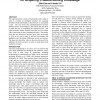Free Online Productivity Tools
i2Speak
i2Symbol
i2OCR
iTex2Img
iWeb2Print
iWeb2Shot
i2Type
iPdf2Split
iPdf2Merge
i2Bopomofo
i2Arabic
i2Style
i2Image
i2PDF
iLatex2Rtf
Sci2ools
IUI
2000
ACM
2000
ACM
User studies of an interdependency-based interface for acquiring problem-solving knowledge
This paper describes a series of experiments with a range of users to evaluate an intelligent interface for acquiring problem-solving knowledge to describe how to accomplish a task. The tool derives the interdependencies between different pieces of knowledge in the system and uses them to guide the user in completing the acquisition task. The paper describes results obtained when the tool was tested with a wide range of users, including end users. The studies show that our acquisition interface saves users an average of 32% of the time it takes to add new knowledge, and highlight some interesting differences across user groups. The paper also describes what are the areas that need to be addressed in future research in order to make these tools usable by end users.
Related Content
| Added | 01 Aug 2010 |
| Updated | 01 Aug 2010 |
| Type | Conference |
| Year | 2000 |
| Where | IUI |
| Authors | Jihie Kim, Yolanda Gil |
Comments (0)

